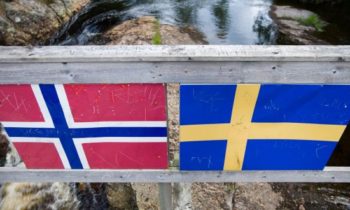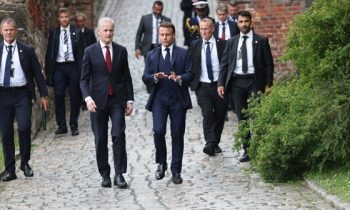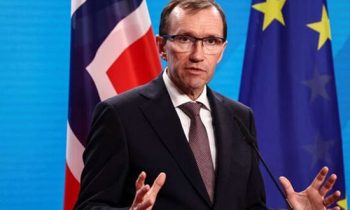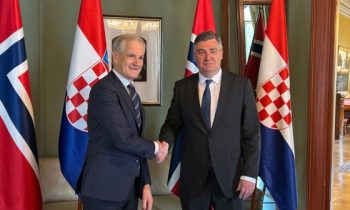 Smuggled garlic and long border queues could supersede diesel laundering and free-flowing traffic should British voters chose to take the United Kingdom – and with it 17 per cent of the island of Ireland – out of the EU.
Smuggled garlic and long border queues could supersede diesel laundering and free-flowing traffic should British voters chose to take the United Kingdom – and with it 17 per cent of the island of Ireland – out of the EU.
That is the warning from Swedish officials who have been dragged into the Brexit debate in Northern Ireland. Last week First Minister Arlene Foster dismissed warnings from Dublin that border and customs checks with the Republic were inevitable should Northern Ireland and the rest of the UK leave the EU.
Pointing to EU member Sweden’s 1640km border – and outer EU wall – with non-member Norway, Ms Foster said that, even after exiting the bloc, a bilateral deal to smooth border controls was “entirely possible”. She pointed to “huge” technological process that could log cross-border traffic and keep trade routes open.
With Norwegian-Swedish trade links worth €18.6 billion annually, there is a huge economic and political interest in keeping trade and traffic flowing between the two countries, despite the EU border separating them.
But Swedish and Norwegian officials say these ties have remained strong because of unique cross-border agreements in place long before Sweden’s EU membership. And even those arrangements cannot undo the customs border, with all the cost and bureaucracy that involves.
Technological advances have streamlined border checks – particularly the use of so-called automatic number plate recognition (ANPR) scanners in both stationary form and on Norwegian police vehicles.
Assisting matters too, he says, is a cultural shift in customs work to the idea that “everyone is doing what they should be doing”. But there is often no alternative to on-site checks – and that can mean long delays.
“Because we have a long border, technical equipment such as scanners and cameras are important, but personnel resources are important too,” said Tony Magnusson, director of Swedish customs in western Sweden. “Not everyone or everything is checked but you can still sometimes have queues of a couple of hours at the border at peak times.”
No technology in the world can replace an experienced pair of custom official eyes, such as an incident three years ago when a Swedish customs official noticed how a truck pulled up at the border.
“The official became suspicious when no one went into the customs clearance office,” said Mr Magnusson. “Inside was undeclared garlic worth €2.5 million.”
The reason for the curious contraband: EU imposes a 9.6 per cent duty on imported foreign garlic, while Norway imposes no garlic import duty meaning extra vigilance is required. Other frequent smuggled goods are alcohol and cigarettes – both expensive in Sweden but even pricier in Norway, making them attractive for smugglers.
Since the 1950s Norway and Sweden – along with Denmark, Finland and Iceland – have permitted passport-free travel similar to that enjoyed between Britain and the Republic of Ireland.
Oslo and Stockholm were nervous that this and other arrangements would cease when Sweden joined the EU in 1995 – leaving Norway outside the bloc.
But an agreement with Brussels in 1997 allowed existing arrangements in place that try to minimise cross-border disruption. Though the customs border has meant that checks cannot be abolished entirely, the two countries have built on a border co-operation agreed in 1959. It has created a law-enforcement and customs check zone 15km on either side of the border, allowing police from both territories operate in the border regions.
Some 10 customs check points operate at border crossings, operated by one or other customs’ services – or often both.
While private vehicles are subject only to spot checks on borders, commercial traffic and heavy goods vehicles are obliged to use the major road border crossing points – or four railway crossings. They are likely to be checked regularly, though measures are in place to streamline the process.
Norway and Sweden have agreed a one-stop shop for customs paper work, allowing them check goods on their neighbour’s behalf: traffic into Norway is checked only once by Norwegian customs while only Swedish customs officials check traffic heading into Sweden.
Though difficult to determine the cost and benefits of the close Swedish-Norwegian co-operation, a 1995 Norwegian study said not having such an arrangement at the border with Sweden – a frontier three times the length of the Northern Ireland-Republic border – would have required 10 new Norwegian customs offices, 100 new customs officers at a cost of around 100 million Norwegian crowns (roughly €10.7 million) in additional expenditure – half of which was an annual, recurring cost.
The same study said around NOK 250 million (€26.8 million) was saved by removing double checks and other bureaucracy at the border.
Despite flattering remarks from Belfast, officials in Sweden and Norway are wary about being dragged into the Brexit debate.
Nordic historical tensions lie further back than the Troubles, they point out, while Norway – like Sweden – is a member of Europe’s Schengen passport-free travel area, meaning there are no immigration controls between the two countries.
Simplifying matters further, Norway is a member of the European Economic Area (EEA), an associate member status which Brexit campaigners have flagged as an option for the UK and Northern Ireland. But that is not a certainty.
“Without Norway in the EEA things would be more complicated for customs checks,” said Mr Magnusson of Swedish customs. “Without Norway in the EEA, ours would be a normal normal third-country border.”
(irishtimes)



